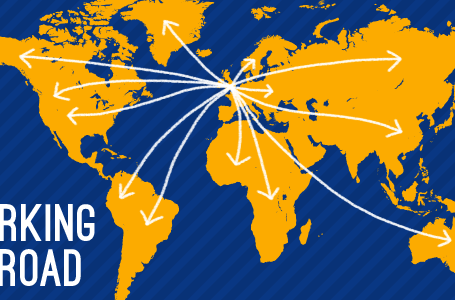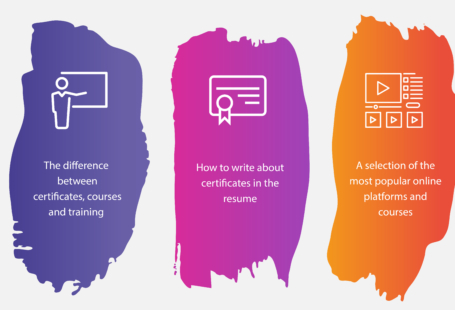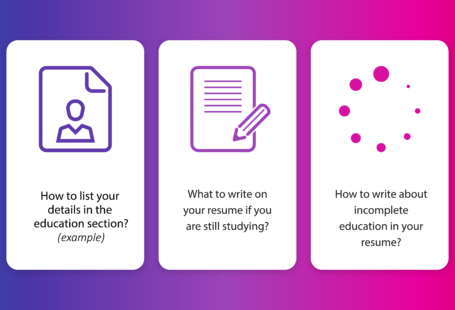When it comes to writing a resume, one of the main questions that most job seekers have is what format and length of the resume will be most effective in their job search. Many applicants believe that the more pages in the resume, the higher their chances of getting the job. However, in reality, this is not always the case. As my grandmother says, it’s not the quantity but the quality that matters! And this applies not only to pies but also to resumes. If you can stand out among all the candidates, then no amount of pages will prevent you from finding your dream job!
In this article, we will discuss:
- General advice on the length of the resume;
- Factors that affect its size;
- The purpose of the resume and how to achieve it;
- The use of keywords and phrases;
- The need for a longer resume in specialized fields;
- Methods for reducing or expanding the resume.
General guidelines on resume length
One-page resumes
A one-pager is a resume format that, like a little black dress, is always appropriate and never goes out of style. It’s not the place for philosophical musings or “how I spent my summer” stories, just the most important information about you. Like that morning coffee, it’s a concentrated dose of information that will quickly perk up the employer.
The optimal length of a resume is one page. Longer resumes give the impression that the applicant cannot summarize their achievements and experience in a concise form
says Steven Rothberg,
partner at BlueSteps
Two-page resumes
If you have a lot of work experience and want to present it in as much detail as possible, a two-page resume may be a good choice. But remember that filling the blank space on the second page with anything other than information can lead to unfortunate consequences – for example, the employer may fall asleep right on your resume.
According to a Zety study, a resume that is 1-2 pages long is the ideal option, while a 3-page resume reduces the chances of getting an interview invitation by 2.6%. So if you want your resume to be successful, it’s better to follow this recommendation – and yes, I agree, 2.6% may not seem like a big number, but who knows, maybe it’s that 2.6% that will become the obstacle on your path to your dream job!
Resume longer than two pages
If you want to write a resume longer than two pages, you will have to be creative and organize the information in a way that the employer does not fall asleep on the first page. Divide the information into logical blocks, use bold, italics and underlining to highlight the most important information, and don’t forget about white space – no one likes text that is too compressed. In general, make your resume in such a way that the employer does not regret spending their time reading it.
Tip: In a world where people don’t read a tweet’s 140 characters to the end, a long resume will deter the reader. Don’t repeat the mistake of an unknown applicant who sent a seven-page poem as a resume in 2016. Be brief and present only the most important information.
If resumes were alive, they would surely hate employers for spending only 6 seconds on their evaluation. But fortunately, our resumes don’t have feelings, so it’s better to make them as short and concise as possible so they immediately grab the employer’s attention and make them continue reading.
For example, a study by TheLadders confirms that in 6 seconds you can only assess the most important information, so it’s not worth the risk to make resumes too long.
When to use each format
The length of a resume may vary slightly for different job markets. In the US, Canada, and most European countries, it is customary to use a one to two-page resume, while in New Zealand and Australia, it may be two to three pages. In Japan, a resume may be more detailed and often includes a candidate’s photograph, but in any case, it is important to present only the most important information.
Tip: if you feel that adding a cool story about how you saved a bear on the weekend will help you get a job, don’t hesitate to include that information in your resume.

Factors influencing the length of a resume
Level of experience
When candidates have a lot of work experience, their resumes may be longer to reflect all of their achievements. However, it’s important to choose only the most significant and relevant information, even if you have a lot to say.
Industry standards
Some industries may require longer resumes than others. For example, in scientific fields, longer resumes are often needed to include detailed descriptions of research and publications.
Relevant skills and achievements
It’s important for your resume to showcase your most relevant skills and achievements that would interest a potential employer. If you have experience related to the job you’re applying for, be sure to highlight it in your resume.
Tip: Just add numbers, percentages, and other math to help the employer understand that you are not only a great specialist, but also good at math. For example, mention the percentage of sales increase, cost reduction, or traffic growth on your projects.
Formatting and design
The design and formatting of a resume play an important role in how it will be perceived by an employer. It’s better to use the same font and size for all text and choose easily readable fonts, such as Times New Roman or Arial, with a size of 11-12. Of course, unless you’re looking for a job as a graphic designer, it’s best to avoid resumes that are “pretty, but incomprehensible”. Let’s leave the colors to the artists and make our resumes a more formal dress code.
Tip: Adjust the length and style of your resume to fit the spirit of your industry. For example, one marketer wrote a resume in the style of a sales letter, describing himself as a product and highlighting his benefits and value to the company. But be careful, if your resume is too sales-oriented, you may accidentally sell yourself at such a high price that the employer can’t afford you!
Resume reduction strategies
A resume that is too long can turn off an employer, so it is important to use reduction strategies. For example, remove irrelevant work experience from your resume, focus on key skills and achievements, and use brief and informative descriptions. It is also advisable to avoid excessive formatting and the use of fonts that are too small.
Removing unnecessary information
Get rid of information that is not relevant to the position you are applying for. For example, if you are applying for an engineering position, you may not need to include a detailed description of your work at a restaurant as a student. If you talk about your childhood work in the kitchen, the employer may start to think that you are more suited to be a cook than an engineer.
Using concise language
Shorten phrases and use more informative expressions. For example, instead of “My work experience includes working as a barista and waiter in a restaurant, where I was responsible for serving customers and maintaining cleanliness in the dining area,” you can write “Experience working as a barista and waiter in a restaurant, responsible for serving customers and maintaining cleanliness in the dining area.”
If you can fit all the necessary information on one page, do it. If you need two pages to give a complete picture of yourself, use two pages. The main thing is not to weigh down your resume with unnecessary information.
Liz Ryan, CEO of Human Workplace.
Formatting for readability
To make it easy for an employer to review your resume, use fonts and font sizes that are easy to read. Highlight headings so that employers can quickly find the necessary information.
Highlighting the most relevant information
If you want to grab the employer’s attention and stand out from other applicants, don’t forget to remind them of your super abilities at the beginning of your resume. Don’t wait for the employer to guess that you are a superhero with super skills! Use keywords to make them understand that you are not just a candidate, but a true goddess/god in your chosen field.
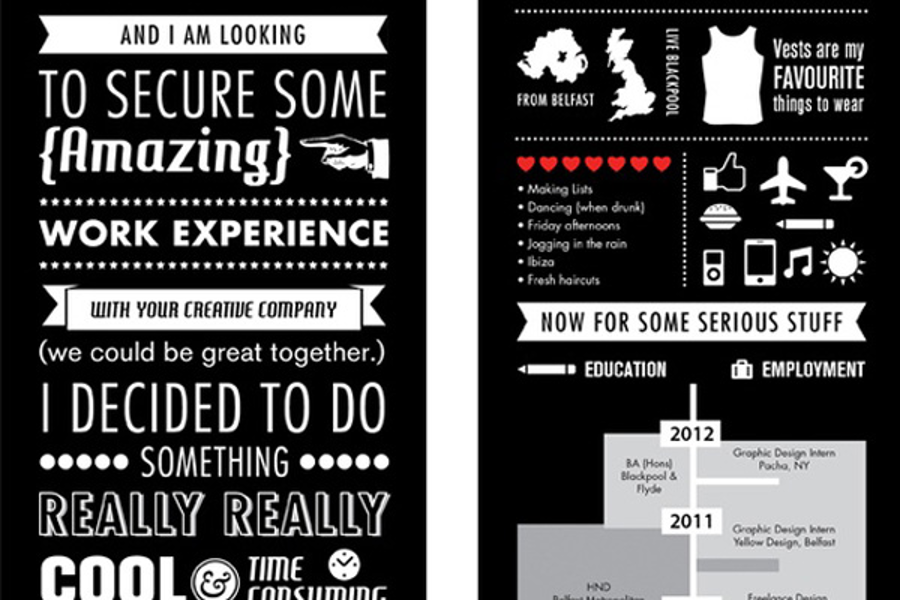
Here’s an example of a [creative] resume (use with caution: we don’t think lawyers, financiers, and managers should adopt this approach)
Resume Expansion Strategies
Including Additional Sections
You can expand your resume by adding additional sections that can improve its informativeness. Some possible sections to include are:
- Professional Goals: Describe your career goals and how you want to develop in the industry.
- Hobbies and Interests: If your hobbies and interests are related to your professional activities, you can mention them in your resume.
- Community Work: If you have volunteered or performed community work, it can demonstrate your social responsibility.
- Language Skills: If you speak multiple languages, it can be an additional advantage for working in an international company.
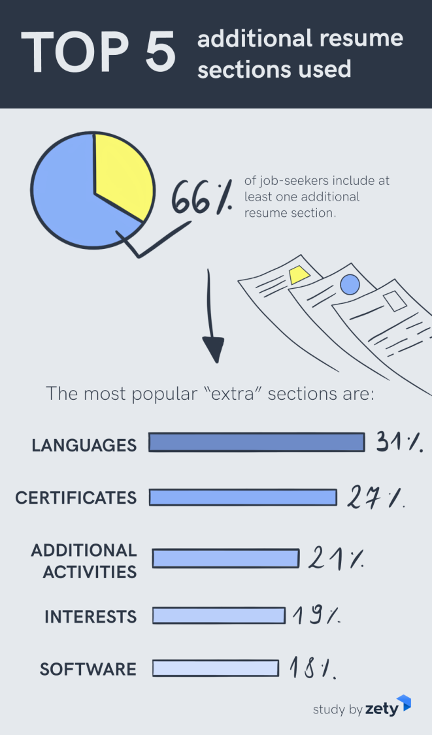
Tip: Don’t expect employers to guess your achievements as if they’re mind readers. Use active verbs when describing work experience to show results and skills. For example, “Managed projects, reducing costs by 20% and increasing productivity by 15%.” No guesswork, just clear results!
Highlighting Transferable Skills
Your work experience may have value for other fields of activity. Therefore, it’s important to highlight skills that can be transferred to other areas. Some examples of such skills include:
- Communication: Ability to communicate effectively with people from different fields of activity.
- Organizational Skills: Ability to plan, manage time and resources, make decisions.
- Teamwork Skills: Ability to work in a team, respect others’ viewpoints, find compromises.
Detailed Description of Achievements
When describing your work experience, it’s important not only to list responsibilities but also to describe achieved results. Even if you were just a “manager’s assistant’s assistant,” don’t hesitate to talk about your work results. Who knows, maybe you were the one who saved the company from bankruptcy by offering a brilliant idea during lunch break?
Adding relevant coursework or certificates
If you have taken courses, received certificates, or participated in professional training, do not hesitate to add this information to your resume. Only add certificates that are relevant to your professional field and are significant to the employer, to demonstrate your commitment to self-development and gaining new knowledge and skills. If you happen to discover that the “Best Farmer in the County” certificate is lost somewhere between garages, it is better not to mention it.
Resume length: Which format is most effective?
Short resume: pros and cons
A short resume has many advantages, such as quick reading for employers and an accurate representation of the applicant’s qualifications. Additionally, it can be conveniently read on a mobile device. However, it is important to consider that a short resume may not contain all important details and may appear superficial if not properly composed.
Long resume: pros and cons
A long resume may be useful for employers seeking experienced candidates and having high requirements for experience and education. It can also be useful for applicants seeking jobs in a specific industry, where detailed descriptions of experience and details may be important.
In conclusion, the summary should summarize and highlight key points. Indicate your work experience and projects of interest, as well as convey that you are ready to take the reins of your future career. For clarity, include your contact information and offer to discuss all details in person.
Conclusions:
- The optimal length of a resume is one or two pages, if you have extensive work experience and achievements.
- The goal of a resume is to arouse the desire to invite you to an interview.
- Use keywords and phrases that reflect the correspondence of your experience to the job requirements.
- In specialized fields, a longer resume may be required for a more detailed description of experience and achievements.
- Leave breathing room on the resume page to make it readable.
- Avoid small fonts and very small fields to avoid complicating reading.
- Use formatting to highlight key information.
- A resume is the first step in the job search process, not a guarantee of a job offer, but it can attract an employer’s attention.

